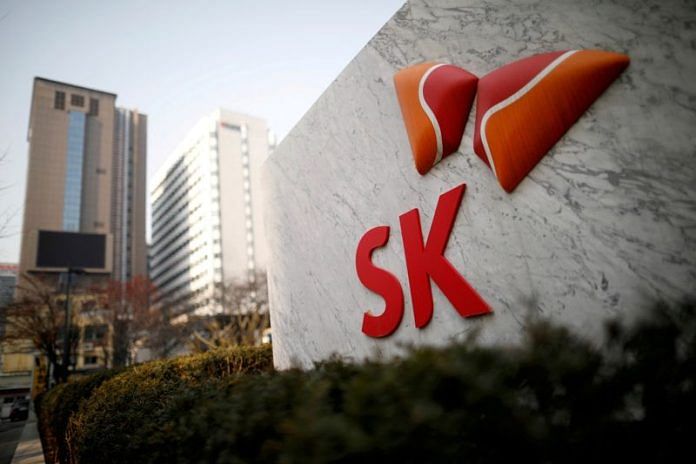By Joyce Lee and Heekyong Yang
SEOUL (Reuters) – South Korea’s SK Group plans to hold a two-day strategy meeting starting Friday to discuss streamlining its business to focus on key areas including artificial intelligence, chips and batteries.
The group, best known for its chip firm SK Hynix, has become bloated over the past decade and its electric vehicle battery unit has lost billions of dollars.
Here is what’s known about the expected restructuring:
WHY AND HOW MIGHT SK TRY TO RESTRUCTURE ITS BUSINESSES?
South Korea’s second-largest conglomerate encompassed 219 companies as of May, the most among the country’s 88 business groups, according to the Korea Fair Trade Commission. By contrast, Samsung Group, the biggest conglomerate by assets, has 63 firms and Hyundai Motor Group has 70.
The SK conglomerate has been thinking about a revamp since four senior executives stepped down late last year. Its main money maker, SK Hynix, also suffered heavy losses last year, stretching the conglomerate’s finances.
The meeting, which will include executives from the parent company and affiliate firms, will look at options from mergers to divestments, according to a source with direct knowledge of the matter who was not authorised to speak to media and declined to be identified.
A SK Group spokesperson described the conglomerate’s review of its businesses as a “routine management activity” to help it better respond to “a changing business environment, including geopolitical issues.”
BATTERY BLUES
SK Innovation, which owns the country’s largest oil refiner and battery maker SK On, is expected to pursue a merger with profitable gas affiliate SK E&S to help prop up SK On, local media outlets have reported.
SK Innovation has said it is considering various strategic measures including mergers to strengthen its competitiveness, but nothing has been decided.
SK On has never made a profit since it was split off from SK Innovation in late 2021. Its cumulative operating losses amount to about 2.3 trillion won ($1.7 billion) while its debt-to-equity ratio was 188% as of end-March.
But the conglomerate sees batteries as a long-term growth area and is trying to cut back investments in other units so it can better support SK On, analysts say.
OTHER BUSINESSES LIKELY TO BE AFFECTED
The conglomerate may also merge builder SK EcoPlant and SK Materials’ industrial gas unit, the Korea Economic Daily reported on Sunday, citing unidentified industry sources.
SK EcoPlant and SK Materials said they were not aware of such discussions.
SK Networks, which sells smartphones and manages hotels, said last week it would sell its car rental unit to private equity firm Affinity Equity Partners for 820 billion won ($590 million).
The group is also in talks to sell its 9% stake in Vietnam’s Masan Group back to the retail-to-telecoms conglomerate, an SK spokesperson said.
($1 = 1,390.0900 won)
(Reporting by Joyce Lee and Heekyong Yang; Additional reporting by Ju-min Park; Editing by Miyoung Kim and Edwina Gibbs)
Disclaimer: This report is auto generated from the Reuters news service. ThePrint holds no responsibilty for its content.




